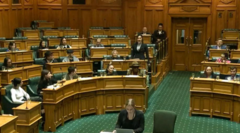The New Zealand parliament has suspended three Māori MPs for performing a haka as a form of protest against a bill that aimed to redefine the Treaty of Waitangi, reigniting debates over indigenous rights and government treatment of the Māori community.
New Zealand Suspends Three Māori MPs for Haka Protest in Parliament

New Zealand Suspends Three Māori MPs for Haka Protest in Parliament
The suspension arises from a protest over a controversial bill attempting to redefine indigenous rights.
New Zealand's parliament has made headlines after suspending three Māori MPs for their bold haka protest during a parliamentary session last year. Opposition MP Hana-Rawhiti Maipi-Clarke, who ignited the protest after being queried about her party, Te Pāti Māori (Māori Party), and its stance on a contentious bill, received a seven-day suspension. Co-leaders of the party, Rawiri Waititi and Debbie Ngarewa-Packer, faced a harsher penalty, with bans lasting 21 days.
The controversial bill that precipitated their protest sought to alter the interpretation of the Treaty of Waitangi, New Zealand's foundational treaty, which has significantly catered to Māori rights. Ultimately, this bill was defeated, emphasizing the growing friction between the conservative government and the Māori populace.
Last November, footage of the trio performing a haka—a traditional Māori dance symbolizing defiance, often showcased at sports events—went viral and garnered international attention. Following a parliamentary committee's recent decision, the conduct of the MPs was said to have the potential to "intimidate" fellow lawmakers. The suspensions are groundbreaking; the previous longest ban for a New Zealand lawmaker was merely three days.
During the parliamentary debate regarding the punitive measures, Maipi-Clarke delivered an impassioned address, declaring, "We will never be silenced, and we will never be lost." She questioned if their vocal expressions were too ardent for the legislative body, hinting at the broader issues of marginalization faced by Māori voices.
The debate was further stirred by comments from New Zealand's Foreign Minister Winston Peters, who referred to Te Pāti Māori as a "bunch of extremists" and implied the public was weary of their presence. The Māori party currently occupies six out of 123 parliamentary seats.
The so-called Treaty Principles Bill—designed to legally define the principles of the Treaty of Waitangi, which was signed in 1840 between the British Crown and Māori leaders—was soundly rejected with a vote of 112 to 11 in April, just days after a governmental review advised against its advancement. Critics of the bill argued it would lead to division rather than unity within the nation.
As public discontent surged, over 40,000 demonstrators took to the streets in November, protesting outside parliament against the proposed legislation. This upheaval signifies a critical moment in New Zealand's ongoing struggle for Māori rights amidst a shifting political landscape.






















